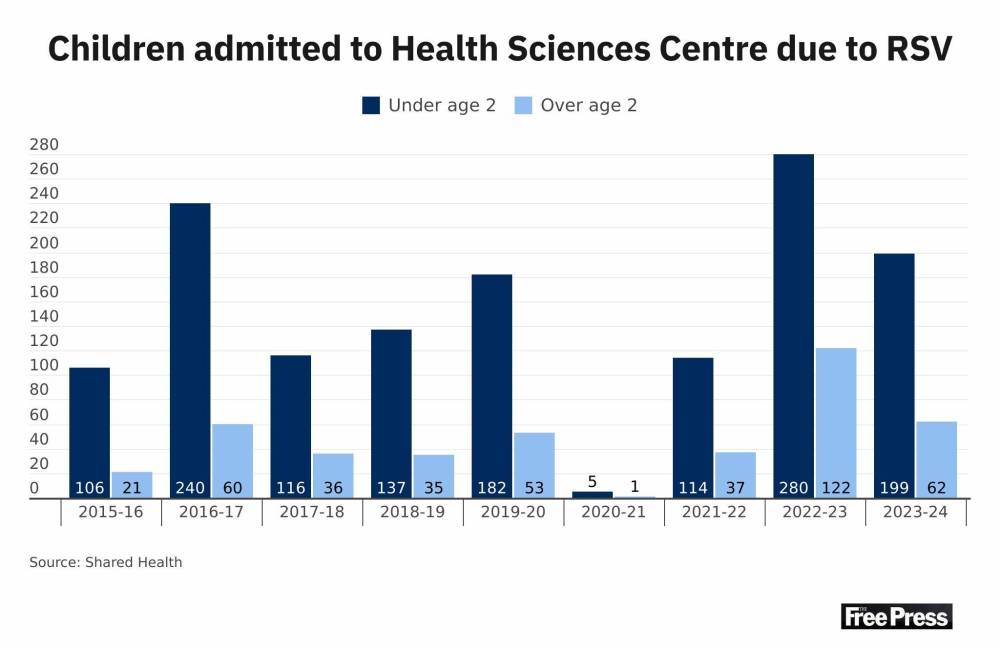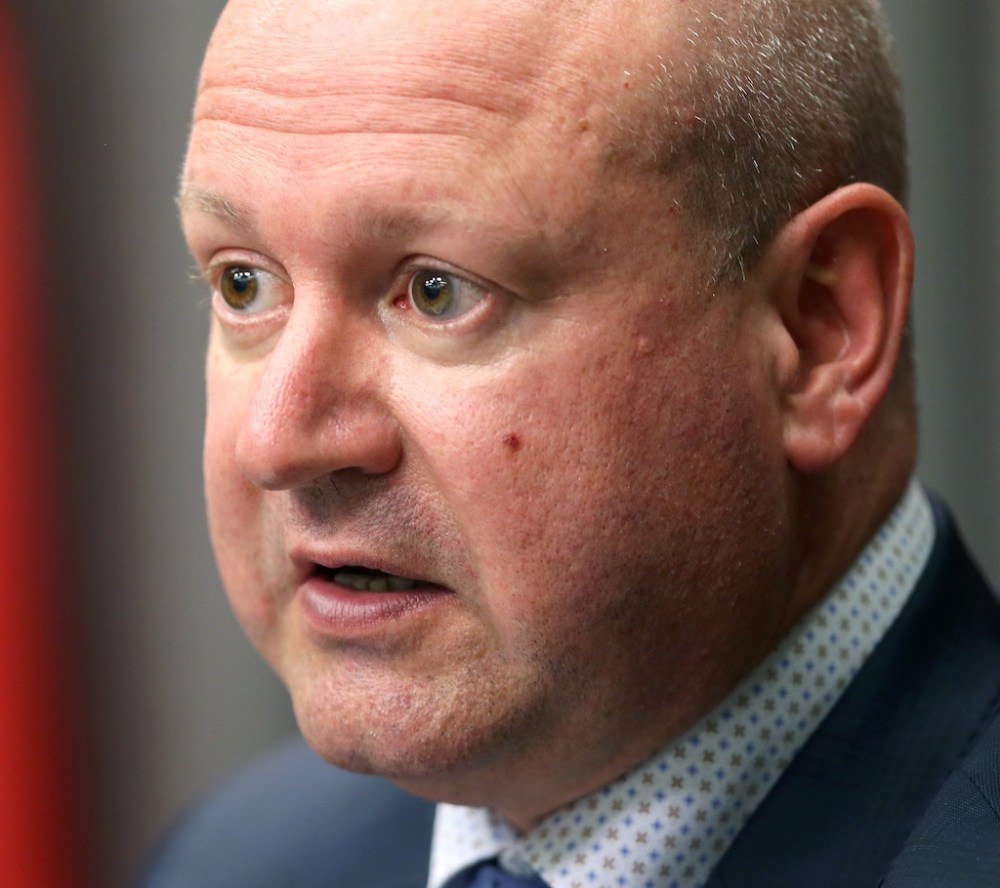Health experts have called on the Manitoba government to offer RSV shots to newborns amid an increase in hospitalizations of babies who have the highly contagious virus.
Ontario and Quebec offer the single-dose monoclonal antibody, called nirsevimab, to infants at no charge and other provinces and territories plan to follow suit.
In Manitoba, currently only high-risk babies, including some premature newborns, can get RSV (respiratory syncytial virus) shots. These are different from the shots offered in Ontario and Quebec and are more expensive. In addition, they must be administered once a month.

Data from Shared Health show the number of admissions of children under two years of age, who are hospitalized with RSV, hit a nine-year high in 2022-23, with 280 admissions at Children’s Hospital. It decreased to 199 admissions in 2023-24, which is still the third-highest rate in the nine-year period.
The average number of admissions for children under two over the past nine RSV seasons is 153.
Epidemiologist Colin Furness said “one of life’s worst things” is to watch a baby struggling to breathe. RSV affects the airways of the lungs and symptoms can include breathing difficulties, coughing, runny nose, fever and loss of appetite. It can lead to pneumonia or bronchiolitis.
Furness believes the RSV shot should be offered to all infants.
“Watching that kind of severe illness and thinking, ‘Wow, there’s a really easy way to avoid this,’ it makes it a really straightforward decision,” said Furness, an associate professor at the faculty of information at the University of Toronto.
JESSICA LEE / FREE PRESS FILES
Epidemiologist Colin Furness believes the RSV shot should be offered to all infants.
He said it will be interesting to see how Manitoba and Ontario compare in terms of RSV hospitalizations this winter.
Ontario’s universal program launched after the National Advisory Committee on Immunization, updated its guidelines to recommend provinces and territories start “building towards a universal RSV immunization program for all infants.”
The body recommended the use of nirsevimab, sold under the brand name Beyfortus, which was approved by Health Canada in April 2023. It has been shown to reduce hospitalization associated with RSV by about 80 per cent and is effective for at least five months.

MIKE DEAL / FREE PRESS FILES
Dr. Aaron Chiu, director of Manitoba’s RSV prophylaxis program.
In Manitoba, only high-risk babies and children have access to an RSV medication called palivizumab. It lasts for about a month, which is why injections are needed regularly during RSV season. It has been found to reduce the risk of hospitalization by between 38 to 86 per cent in infants at risk of severe infection.
This year, Manitoba tried unsuccessfully to switch from palivizumab, which can cost between $5,000 to $9,000 a season, to nirsevimab, which has a list price of about $1,000, said Dr. Aaron Chiu, director of Manitoba’s RSV prophylaxis program. Doing so would have allowed the province to expand access beyond the 250 to 300 high-risk children under age four who receive it today, he said.
The plan hit a roadblock when the province couldn’t secure the shots, Chiu said.
Sanofi, the pharmaceutical company that sells nirsevimab, prioritized provinces that offer universal programs and Manitoba needed to be sure it had enough doses, he said. So it went with palivizumab.
In a statement, Sanofi spokesperson Alana Vineberg said: “Beyfortus will only be available through publicly funded programs this year.”
Dr. Brent Roussin, Manitoba’s chief public health officer, said the province looks to the national advisory committee for guidance on immunization, emphasizing the body only recommends “building towards” the universal program currently.

KEVIN KING / FREE PRESS FILES
Dr. Brent Roussin, Manitoba’s chief public health officer.
“We’re certainly looking at it,” Roussin said about a future universal program. Any such program rollout would require consideration of cost, resources, procurement and logistics of administration. He did not have an estimate of what it might cost.
Doctors Manitoba echoed Roussin’s comments, saying in a statement it supports the approach recommended by the national advisory committee.
As for the rising RSV hospitalizations in children, Roussin said two years ago was a particularly bad RSV season across Canada. “Immunity debt” after years of COVID-19 isolation may have played a role, he said.
This year, the RSV season in the southern hemisphere was “typical,” suggesting we might see the same, he said.
Local health experts would like to see change now.
“It is critical that Manitoba fund this shot,” said Barbara Porto, an assistant professor in the department of medical microbiology and infectious diseases at the University of Manitoba. “It’s crucial to protect infants throughout the winter… it’s a huge burden for the health-care system across Canada.”
Dr. Philippe Lagacé-Wiens, a medical microbiologist at St. Boniface Hospital, would like to see Manitoba offer a universal program. He noted Ontario also covers the cost of an RSV vaccine called RSVpreF for pregnant women who deliver around RSV season. The vaccine protects their babies.
In Manitoba, patients can pay out of pocket for RSVpreF at a rate of about $300, creating a “two-tier system,” Lagacé-Wiens said.
The national advisory committee recommends infants receive nirsevimab rather than have pregnant women receive RSVpreF.
katrina.clarke@freepress.mb.ca

Katrina Clarke
Investigative reporter
Katrina Clarke is an investigative reporter at the Winnipeg Free Press. Katrina holds a bachelor’s degree in politics from Queen’s University and a master’s degree in journalism from Western University. She has worked at newspapers across Canada, including the National Post and the Toronto Star. She joined the Free Press in 2022. Read more about Katrina.
Every piece of reporting Katrina produces is reviewed by an editing team before it is posted online or published in print — part of the Free Press‘s tradition, since 1872, of producing reliable independent journalism. Read more about Free Press’s history and mandate, and learn how our newsroom operates.
Our newsroom depends on a growing audience of readers to power our journalism. If you are not a paid reader, please consider becoming a subscriber.
Our newsroom depends on its audience of readers to power our journalism. Thank you for your support.